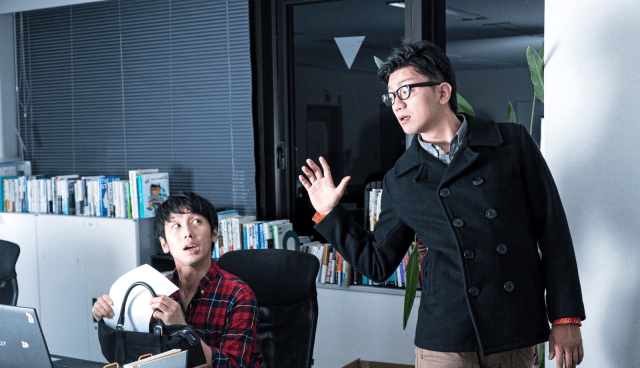
When you’re leaving the office before your coworkers, you don’t tell them “Sayonara,” you tell them “I’m being rude.”
Japan has a complicated relationship with the concept of overtime work. On the one hand, pride in your profession and going above and beyond the bare minimum for the sake of the group are cornerstones of Japanese culture, and both have deep and direct connections to the peace and economic prosperity that Japan has enjoyed for so much of the post-war era. But at the same time, a societal expectation that employees should be willing to regularly put in several hours at the office after their shifts are supposed to end can pose a serious danger to people’s mental and physical health.
In recent years, there’s been an increased effort by companies and workers’ advocacy groups to reduce the amount of overtime Japanese employees feel obligated to do. However, Japanese Twitter user @AdmiralYamabiko feels that all the progressive managers and government guidelines Japan throws at the problem won’t do any good until one part of Japanese linguistics gets reformed too.
「残業をできるだけなくしましょう」みたいなこと言われる度に「お先に失礼します」とかいう挨拶が残ってるうちは無理だと思う。定時には「ジャーンジャーン」と銅鑼みたいな何かを鳴らし、帰る人が「甘寧一番乗り!」って言って、残ってる人が「遅れを取るな!我らも続けー!」って言うようにすべき。
— やまびこ (@AdmiralYamabiko) October 13, 2018
Spend even a day in a Japanese office, and you’ll hear the phrase “Osaki ni shitsurei shimasu,” which is something people say to any coworkers still in the office as they walk out the door on their way home. However, even though that makes it functionally a substitute for “goodbye,” the literal meaning of the phrase is:
“I am being rude by leaving before you.”
▼ Pictured on the right: A jerk?
Granted, the frequency with which osaki ni shitsurei shimasu gets used gives it a bit more of a familiar feel to native Japanese speakers, but the sentiment is still “Excuse me for going home before you,” with an explicitly stated acknowledgment that by leaving the office first, you’re putting yourself first by not helping your coworkers out with the remaining workload of the staff as a whole.
“Every time I hear someone say ‘Let’s try to limit our overtime to as little as possible,’” tweets @AdmiralYamabiko, “I think it’s going to be impossible as long as people still say ‘Osaki ni shitsurei shimasu.’”
So what would @AdmiralYamabiko like to see replace the phrase? His suggestion is that at the designated time employees’ shift is supposed to end, the company should strike a war gong, and whoever’s ready to lead should stalwartly make their way to the exit while boldly announcing “Ichiban nori,” a phrase used by warlords of the feudal era that roughly translates to “I’m leading the charge!” Doing so would change the image of whoever’s leaving the office first from lazy clock-watcher to valiant vanguard leader, and thus encourage anyone still working to wrap up as soon as possible so they don’t fall behind the gallant head of the formation.
@AdmiralYamabiko’s idea produced online reactions such as:
“I like it. It makes going home seem like a positive thing. You could even have the company president get in on it by ordering everyone to ‘Withdraw from the field of battle!’”
“But what if someone else says ‘Wait! It could be a trap! Hold your positions!’”
“It might only make a small difference, but I think it’s worth a shot to start trying to limit how often we say ‘Osaki ni shitsurei shimasu.’”
“We need to start thinking of people who can finish their work without doing overtime as heroes.”
Unfortunately, that last point is something that’s not so simple in Japanese culture. Yes, being a capable, productive worker is definitely considered worthy of respect in Japan, but unless everyone else is ready to go home too, there’s likely to be a segment of the population that feels it’s selfish to be the first to clock out for the day. Because of that, managers and human resource departments continue to bear a huge responsibility to make sure staff sizes and individual workloads are kept at reasonable levels.
It’s also worth pointing out that just like English-speakers sometimes use the phrase “Excuse me” without actually feeling any deep or genuine guilt, it’d be an exaggeration to say that Japanese people are actually wracked with shame every time they say “Osaki ni shitsurei shimasu.” Still, a shift in semantics so that workers don’t have to apologize for going home when their shifts end could be an important step in Japan achieving a more moderate work/life balance.
Source: Twitter/@AdmiralYamabiko via Jin
Top image: Pakutso
Insert images: Pakutaso (1, 2)
Following Casey on Twitter requires no apologies in Japanese or English.



 Say sayonara to “sayonara” – 70% of Japanese people don’t use this word for goodbye anymore
Say sayonara to “sayonara” – 70% of Japanese people don’t use this word for goodbye anymore Tokyo advertising company institutes mandatory lights-out time following employee suicide
Tokyo advertising company institutes mandatory lights-out time following employee suicide Japanese companies want to monitor employees working overtime using in-office flying drones
Japanese companies want to monitor employees working overtime using in-office flying drones Japan’s “workstyle reforms” are actually making managers’ jobs a lot harder【Survey】
Japan’s “workstyle reforms” are actually making managers’ jobs a lot harder【Survey】 Japanese government’s newest plan to fight overwork: Give employees Monday morning off
Japanese government’s newest plan to fight overwork: Give employees Monday morning off Foreigner’s request for help in Tokyo makes us sad for the state of society
Foreigner’s request for help in Tokyo makes us sad for the state of society Japanese city loses residents’ personal data, which was on paper being transported on a windy day
Japanese city loses residents’ personal data, which was on paper being transported on a windy day Should you add tartar sauce to Japanese curry rice? CoCo Ichi makes diners an unusual offer
Should you add tartar sauce to Japanese curry rice? CoCo Ichi makes diners an unusual offer Seaside scenery, history, and so many desserts on Yokohama’s Akai Kutsu【Japan Loop Buses】
Seaside scenery, history, and so many desserts on Yokohama’s Akai Kutsu【Japan Loop Buses】 Red light district sushi restaurant in Tokyo shows us just how wrong we were about it
Red light district sushi restaurant in Tokyo shows us just how wrong we were about it Mt. Koya planning to instate visitor’s tax to cope with huge tourist numbers
Mt. Koya planning to instate visitor’s tax to cope with huge tourist numbers Tokyo Tsukiji fish market site to be redeveloped with 50,000-seat stadium, hotel, shopping center
Tokyo Tsukiji fish market site to be redeveloped with 50,000-seat stadium, hotel, shopping center Beautiful Ghibli sealing wax kits let you create accessories and elegant letter decorations【Pics】
Beautiful Ghibli sealing wax kits let you create accessories and elegant letter decorations【Pics】 Harajuku Station’s beautiful old wooden building is set to return, with a new complex around it
Harajuku Station’s beautiful old wooden building is set to return, with a new complex around it Kyoto breakfast buffet with all-you-can-eat sushi: One of the best possible ways to start a day
Kyoto breakfast buffet with all-you-can-eat sushi: One of the best possible ways to start a day McDonald’s new Happy Meals offer up cute and practical Sanrio lifestyle goods
McDonald’s new Happy Meals offer up cute and practical Sanrio lifestyle goods Japanese ramen restaurants under pressure from new yen banknotes
Japanese ramen restaurants under pressure from new yen banknotes French Fries Bread in Tokyo’s Shibuya becomes a hit on social media
French Fries Bread in Tokyo’s Shibuya becomes a hit on social media Studio Ghibli releases new action figures featuring Nausicaä of the Valley of the Wind characters
Studio Ghibli releases new action figures featuring Nausicaä of the Valley of the Wind characters New private rooms on Tokaido Shinkansen change the way we travel from Tokyo to Kyoto
New private rooms on Tokaido Shinkansen change the way we travel from Tokyo to Kyoto All-you-can-drink Starbucks and amazing views part of Tokyo’s new 170 meter-high sky lounge
All-you-can-drink Starbucks and amazing views part of Tokyo’s new 170 meter-high sky lounge Studio Ghibli releases Kiki’s Delivery Service chocolate cake pouches in Japan
Studio Ghibli releases Kiki’s Delivery Service chocolate cake pouches in Japan New definition of “Japanese whiskey” goes into effect to prevent fakes from fooling overseas buyers
New definition of “Japanese whiskey” goes into effect to prevent fakes from fooling overseas buyers Our Japanese reporter visits Costco in the U.S., finds super American and very Japanese things
Our Japanese reporter visits Costco in the U.S., finds super American and very Japanese things Studio Ghibli unveils Mother’s Day gift set that captures the love in My Neighbour Totoro
Studio Ghibli unveils Mother’s Day gift set that captures the love in My Neighbour Totoro More foreign tourists than ever before in history visited Japan last month
More foreign tourists than ever before in history visited Japan last month New Pokémon cakes let you eat your way through Pikachu and all the Eevee evolutions
New Pokémon cakes let you eat your way through Pikachu and all the Eevee evolutions Sales of Japan’s most convenient train ticket/shopping payment cards suspended indefinitely
Sales of Japan’s most convenient train ticket/shopping payment cards suspended indefinitely Sold-out Studio Ghibli desktop humidifiers are back so Totoro can help you through the dry season
Sold-out Studio Ghibli desktop humidifiers are back so Totoro can help you through the dry season Japanese government to make first change to romanization spelling rules since the 1950s
Japanese government to make first change to romanization spelling rules since the 1950s Ghibli founders Toshio Suzuki and Hayao Miyazaki contribute to Japanese whisky Totoro label design
Ghibli founders Toshio Suzuki and Hayao Miyazaki contribute to Japanese whisky Totoro label design Doraemon found buried at sea as scene from 1993 anime becomes real life【Photos】
Doraemon found buried at sea as scene from 1993 anime becomes real life【Photos】 Tokyo’s most famous Starbucks is closed
Tokyo’s most famous Starbucks is closed One Piece characters’ nationalities revealed, but fans have mixed opinions
One Piece characters’ nationalities revealed, but fans have mixed opinions We asked a Uniqlo employee what four things we should buy and their suggestions didn’t disappoint
We asked a Uniqlo employee what four things we should buy and their suggestions didn’t disappoint Princesses, fruits, and blacksmiths: Study reveals the 30 most unusual family names in Japan
Princesses, fruits, and blacksmiths: Study reveals the 30 most unusual family names in Japan Tokyo company plays Rocky theme for workers every day to cut overtime, boost productivity
Tokyo company plays Rocky theme for workers every day to cut overtime, boost productivity Spend a shift working in a terrible, soul-crushing Japanese company at this “special” Tokyo event
Spend a shift working in a terrible, soul-crushing Japanese company at this “special” Tokyo event Five ways to piss off your older Japanese coworkers at a new job
Five ways to piss off your older Japanese coworkers at a new job Japanese company uses video game-style hit point badges to help employees know who needs a hand
Japanese company uses video game-style hit point badges to help employees know who needs a hand Awesome Japanese company wins Internet’s heart with its special coronavirus bonus for employees
Awesome Japanese company wins Internet’s heart with its special coronavirus bonus for employees Vending machines in Tokyo Station not getting restocked, exploitative “black company” to blame
Vending machines in Tokyo Station not getting restocked, exploitative “black company” to blame Is it rude to eat when your food arrives first at a restaurant? Japanese people weigh in
Is it rude to eat when your food arrives first at a restaurant? Japanese people weigh in Which jobs in Japan have the most and least overtime? Survey investigates
Which jobs in Japan have the most and least overtime? Survey investigates Japanese manners debate: Is it OK to tell your coworkers “I’ve found a new job?”
Japanese manners debate: Is it OK to tell your coworkers “I’ve found a new job?” Is Japan overworking its teachers? One exhausted educator says, “YES!”
Is Japan overworking its teachers? One exhausted educator says, “YES!” Five magic Japanese phrases to know before starting a job in Japan
Five magic Japanese phrases to know before starting a job in Japan Final Fantasy developer Square Enix makes working from home a permanent option for employees
Final Fantasy developer Square Enix makes working from home a permanent option for employees Woman sues Tokyo company after having to work 48 days in a row with limited bathroom breaks
Woman sues Tokyo company after having to work 48 days in a row with limited bathroom breaks Majority of surveyed Japanese workers have dated a coworker, over 20 percent their boss or senpai
Majority of surveyed Japanese workers have dated a coworker, over 20 percent their boss or senpai Spanish Prime Minister’s “Japanese-style strike” remark shows a warped view of working in Japan
Spanish Prime Minister’s “Japanese-style strike” remark shows a warped view of working in Japan
Leave a Reply